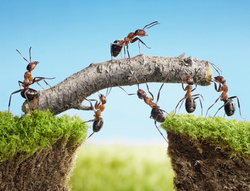Collaboration: Better Than The Sum
 In my article, So far, the promise of digital music falls short, I discussed the mixed blessings of the digital revolution in music. The revolution began with great promise, leading many of us to believe it would be a silver bullet empowering unknown artists and bands, freeing them from the tyranny of the record industry. Though I place part of the blame on a shift in power from the record companies to major technology companies like Apple and Google, I also much acknowledge my own contribution along with those of my fellow musicians.
In my article, So far, the promise of digital music falls short, I discussed the mixed blessings of the digital revolution in music. The revolution began with great promise, leading many of us to believe it would be a silver bullet empowering unknown artists and bands, freeing them from the tyranny of the record industry. Though I place part of the blame on a shift in power from the record companies to major technology companies like Apple and Google, I also much acknowledge my own contribution along with those of my fellow musicians.
The technological progress that has empowered home recording and a project studio in your garage has intoxicated many of us. We have become so engrossed in what the technology does for us that we've forgotten the power of the music itself. All of us are familiar with the sight of ourselves and those around us, shuffling downtown sidewalks, hunched over our mobile phones, tablets and game devices. We no longer talk to each other because we're too busy keeping up with our 100s or 1000s of Facebook friends and Twitter followers.
So what's that have to do with music? Well, as musicians we've caught the same disease. We hunch down in our bedrooms, closets and garages. We write, arrange and records songs by ourselves, leveraging technology to fill the void left by the musicians that would have been essential a few decades ago. In the process we've deprived ourselves and our listeners of the real magic that is music.
Until very recently, music was a binding force in the community. It served to communicate a cultural history, shared experiences and catalyzed community gatherings. Musicians joined together to perform, sometimes spontaneously. Without those musicians there would have been no music, given that recording technology and music distribution are very young technologies relative to human history.
This realization hit me hard over the last few years. My struggles adjusting to my new home in Bozeman led me to realize that my own actions have been a big part of my own isolation. I built a recording studio in Redwood City, and proceeded to spend hours and hours alone in it, with the Christmas Rhapsody and Danger, Ltd. sessions standing out as the only real exceptions. That realization has been a major contributor to my vision for the Music Tech Center, but even that vision could veer off track and lead to isolation.
In truth, my most satisfying creative projects have always been working side-by-side with other energetic, highly creative people. Whether in software or music, it's the collaborative energy that has fueled the most interesting and satisfying results. Unfortunately, the displacement of many commercial recording studios by home recording technology has eaten away at the collaborative opportunities in music. I am saddened to see musicians forget the power of collaboration. Much like the commuter with a mobile phone, we tune out our surroundings and write, arrange and record our music alone, place aural and creative blinders around us to shut out the distraction. We forget that the distraction from, and interaction with other musicians is the secret ingredient to most musical creations.
By working with others, we end up with a creation that could not have existed based on the work of one. And, at least in my own experience, not only are the results more interesting but the process is more enjoyable. Being stretched beyond our own comfort zones, trying new things based on suggestions from our collaborators, that's where the real magic begins.
Personally, I need to revisit the role that technology plays in my music. It's a tool, meant to facilitate the process of creating and recording music. It's not an excuse to avoid other musicians, or hide from the audience. Music is notes, chords, rhythms, timbres; it's an aural phenomenon. No matter how it's sonic qualities are generated, in the end, it just matters how it sounds and how it makes each of us feel. The more we remember the joy of experiencing music together, the more we'll experience the power of music.
I encourage you to think about how technology has influenced the way you listen to and create music. Are the tools getting in the way? Have you forgotten how to collaborate with other musicians? What steps can we all take to wrest the musical process from the grip of technology and return it to the people that experience it?
 3 Comments → Posted on
3 Comments → Posted on  Monday, April 23, 2012 at 5:41PM
Monday, April 23, 2012 at 5:41PM  collaboration,
collaboration,  community,
community,  creating music,
creating music,  music,
music,  rehearsal,
rehearsal,  songwriting,
songwriting,  teamwork,
teamwork,  technology | in
technology | in  Perspective
Perspective 